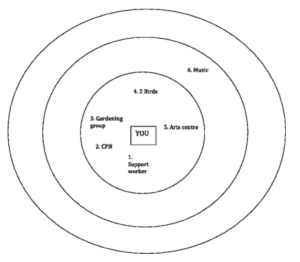Taking care of a pet can often feel like a full-time job, but have you ever stopped to think about how they also take care of us?
According to a new study, our pets serve to comfort us when we need it the most, especially for people with mental illnesses. When asked what helped them manage their condition, many people said their pets helped the most.

“Many felt deep emotional connections with their pet that weren’t available from friends and family,” said Helen Brooks, a mental health researcher at the University of Manchester in the U.K. and lead author of the study, to NPR.
The researchers interviewed 54 people with serious long-term mental illnesses. Of the group, 25 of the participants considered their pets part of their social network.
“When I’m feeling really low they are wonderful because they won’t leave my side for two days,” said one study participant with two dogs and two cats. “They just stay with me until I am ready to come out of it.”
The participants were asked who they went to for help or advice, where they gained emotional support and encouragement, and how they spent their days. They were then given a diagram to complete. The diagram had three consecutive circles surrounding a square in the middle to represent the participant.

Credit: BMC Psychiatry
They were asked to write the people, places and things that gave them support into the circles, with the circles closest to the center being the most important. Sixty percent of people placed their pets in the central circle, next to family.
“I think it’s really hard when you haven’t had a mental illness to know what the actual experience is [like],” said one participant. “There’s like a chasm, deep chasm between us … [Other people are] on one side of it, and we’re on the other side of it. We’re sending smoke signals to each other to try and understand each other but we don’t always — we don’t always understand.”
Brooks said many individuals with mental illness find themselves isolated. They start to see less of their friends and pets can give affection without understanding the disorder, she said.
“[Pets] don’t look at the scars on your arms,” said one participant. “They don’t question where you’ve been.”
In addition to providing emotional support and closeness, the participants also said their animals distract them from their illness. One participant placed his pet birds in his closest social circle.
“They help me in the sense, you know, I’m not thinking about the voices, I’m just thinking of when I hear the birds singing,” the participant said.
Mark Longsjo, program director of adult services at McLean Southeast, an inpatient mental facility in Middleborough, Massachusetts, said the participant interviews reflect his professional experiences.
“I think there’s significant value in considering the common everyday pet to be as important as the relationships one has with one’s family in the course of their treatment,” he said.
The pets also keep people from withdrawing from the world. One participant said their cats keep them involved, while another said getting out of the house to walk the dog helps.
“That surprised me, you know, the amount of people that stop and talk to him, and that, yeah, it cheers me up with him,” the participant said. “I haven’t got much in my life, but he’s quite good, yeah.”
Tori Linville is a freelance writer and editor from Clarksville, Tennessee. When she isn’t writing or teaching, she’s faithfully watching her alma mater, the University of Alabama, dominate the football field.


![How To: ‘Fix’ Crepey Skin [Watch]](https://cdn.vitalupdates.com/wp-content/uploads/2017/05/bhmdad.png)












